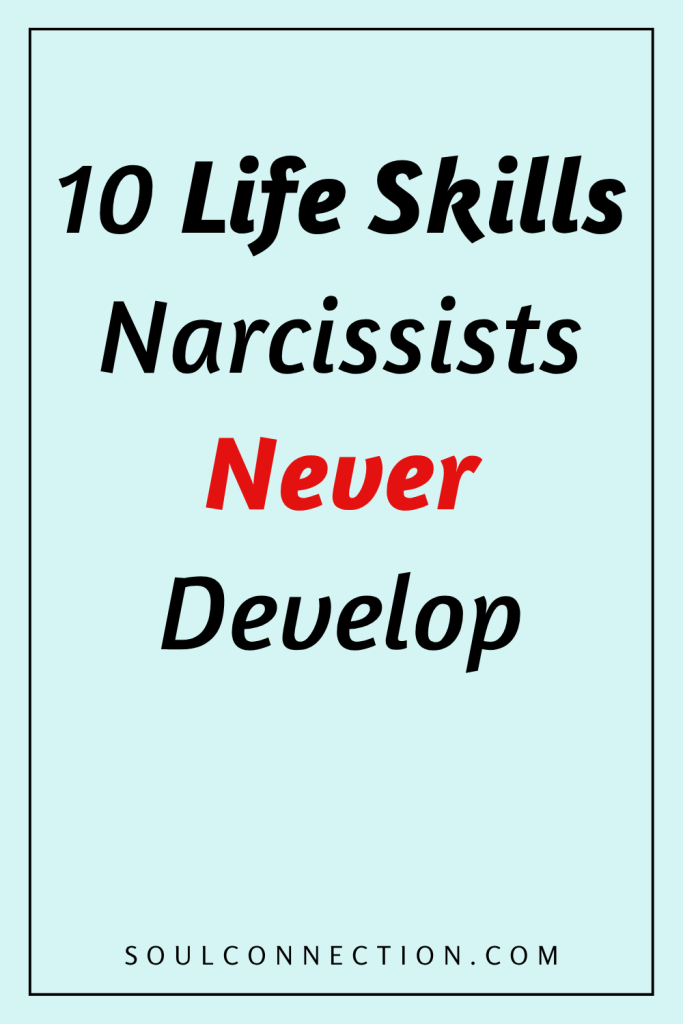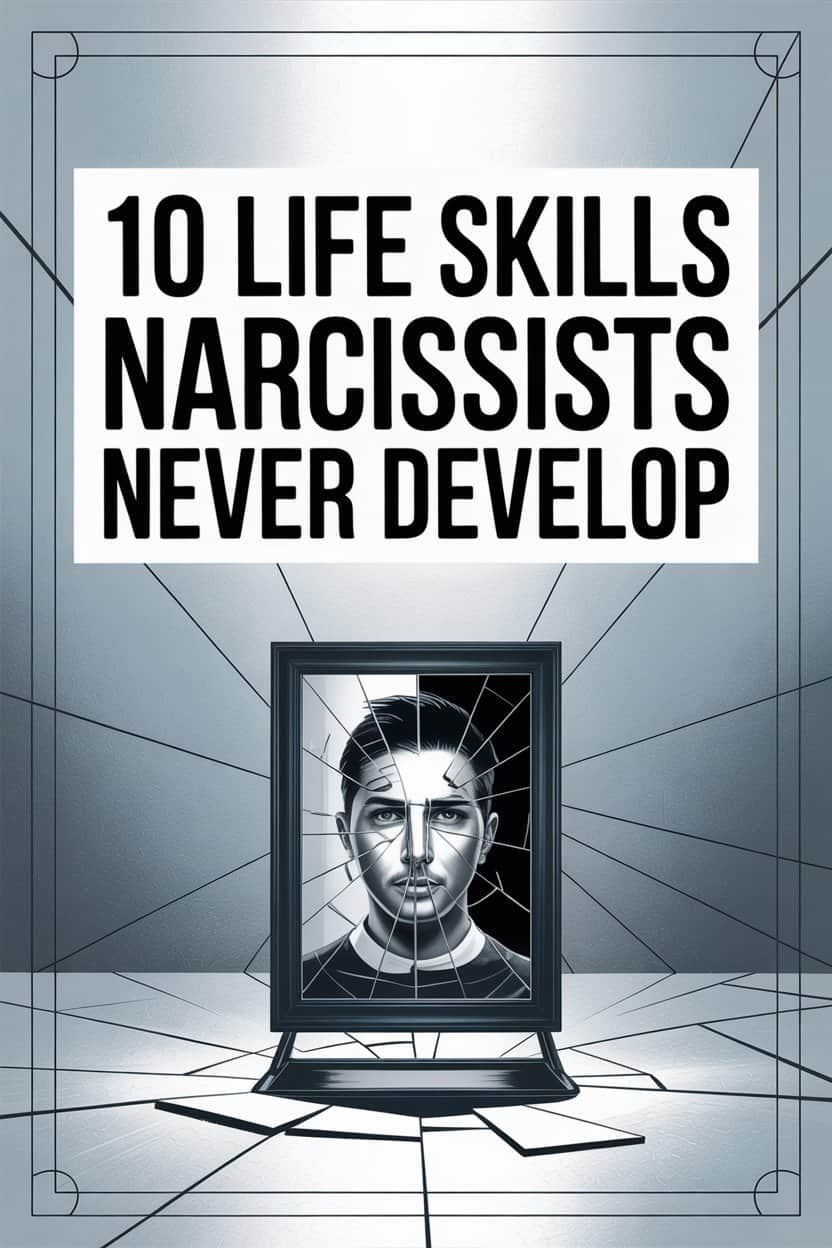Ever tried teaching a goldfish how to ride a bicycle? That’s about as fruitful as waiting for a narcissist to pick up certain life skills.
Sure, they may look the part and utter the right words every now and then, but when it comes down to the things that make adult relationships work—well, let’s just say there’s a gaping void where those skills should be.
If you’ve ever wondered why talking to a narcissist feels like yelling into the Grand Canyon, or why your emotional needs seem to bounce off them like a rubber ball, this one’s for you.
Grab a cuppa, and let’s peel the curtain back on the ten life skills that always seem to elude the narcissist—no matter how thick the self-help section gets.
1. Listening Without Plotting Their Response
Genuine listening is an Olympic event for narcissists. While you’re pouring your heart out, they’re already mentally drafting their retort, plotting how to spin the conversation back to their favorite subject: themselves.
Narcissists don’t so much listen as they wait for their turn to speak.
It’s a bit like phoning customer service and hearing, “Your call is important to us”—only to be put on hold forever.
If your partner constantly interrupts, reroutes, or dismisses your feelings, you might be dealing with someone who never learned that communication is a two-way street.
2. Admitting Fault Without a Three-Ring Circus
Responsibility? That’s for peasants. A narcissist’s world is one where “I’m sorry” is either weaponized or avoided like a gluten-laden cake at a celiac convention.
When pressed, the closest they come to an apology involves a backhanded “I’m sorry you feel that way,” which, shockingly, is not quite the same thing. Accountability requires vulnerability—a foreign language in Narcissistland.
3. Empathizing Without Making It About Them
Empathy is hard when your emotional universe begins and ends with your own reflection.
When someone else is hurting, the narcissist’s first instinct is to out-hurt them, one-up their story, or offer the sort of “comfort” that somehow spotlights their own suffering.
Chances are, you’ll hear about the time your stubbed toe reminds them of their traumatic hangnail incident of ’09. Actual, selfless empathy? That’s always just out of reach.
4. Accepting Constructive Criticism Like an Adult
Handing feedback to a narcissist is like tossing a snowball into a volcano. There’s an eruption, some melting, and a whole lot of drama.
Any suggestion that they aren’t already perfect is met with denial, rage, or elaborate rationalizations that would make a defense attorney blush.
A healthy relationship needs two people who can admit they aren’t infallible. With a narcissist, expect to be the sole student in the school of self-improvement.
5. Delaying Gratification (Patience Isn’t a Virtue, It’s a Nuisance)
Impulse control and long-term planning aren’t exactly their strong suits. Narcissists chase praise, pleasure, and shiny new things like magpies with a sugar rush.
If something doesn’t benefit them immediately, interest evaporates faster than a summer puddle.
This relentless pursuit of instant gratification can make them unreliable, flakey, and perpetually dissatisfied. Meanwhile, you’re left holding the bag (and probably the bill).
6. Maintaining Boundaries With Respect (Yours, Not Theirs)
Boundaries are for other people. A narcissist’s rules are more like guidelines—suggestions, really—for everyone else.
They expect unwavering loyalty, privacy, and devotion, all the while treating your own limits as optional and your personal space as community property.
Ever tried explaining your need for alone time to a narcissist? Watch as it’s recast into an accusation, a personal slight, or a reason they absolutely must text you seventeen times in a row.
7. Genuinely Applauding Someone Else’s Success
Envy is a full-time job. Every compliment you receive, every achievement you celebrate, triggers a primal urge to knock you down a peg or at least reclaim the spotlight.
Don’t expect sincere joy for your promotion, new car, or even a good hair day.
Instead, brace for passive-aggressive comments, shifting goalposts, or the dreaded “Well, actually, when I…” It’s less about celebrating you, more about restoring the natural order: them on top.
8. Accepting Things They Can’t Control (Spoiler: That’s Most Things)
Life’s curveballs happen to all of us, but for narcissists, any threat to their sense of omnipotence feels like a personal attack.
When something goes south—traffic, weather, losing a board game—out comes the tantrum, blame game, or conspiracy theory.
Adaptability requires humility, the ability to roll with the punches, and maybe even laugh at oneself. Narcissists would rather rewrite reality, thank you very much, than admit they’re not the main character in every script.
9. Building Deep, Mutual Relationships
Superficial charm? Check. Actual intimacy? Not so much.
Narcissists are pros at the honeymoon phase—think grand gestures, witty banter, and intense eye contact—but maintaining a deep, supportive relationship is another story.
When the initial thrill fades and real emotional labor is needed, they struggle to connect. Surface-level chatter and transactional relationships are their comfort zone.
Anything requiring trust, vulnerability, or reciprocity gets filed under “optional.”
10. Self-Reflection Without Self-Obsession
Mirror, mirror, on the wall, who’s the most misunderstood of them all? Narcissists do look inward—a lot—but only to reinforce their own myth.
Honest self-reflection, the kind that leads to growth and change, is almost impossible because it requires admitting shortcomings.
Real introspection can be uncomfortable, messy, and not always flattering. For narcissists, the mirror’s job is to flatter, not reflect reality.
So, progress is measured in how well they can spin the narrative, not in genuine growth.
What to Do If This List Sounds Familiar
Spotting these missing skills in someone close to you can be sobering.
Maybe you’re recognizing your partner, your boss, or, in a plot twist, yourself (hey, no judgment—self-awareness is a journey, not a destination).
If this is hitting home, it’s not your job to fill in the gaps or fix anyone’s emotional toolkit. Healthy boundaries are your best friend.
Direct communication, clear limits, and self-care aren’t just buzzwords—they’re survival strategies.
Above all, remember: Your needs, feelings, and successes deserve respect and recognition, not just from others, but from yourself too.
No amount of patience or empathy can compensate for someone else’s refusal to grow. It’s okay to expect more—because you’re worth it .


